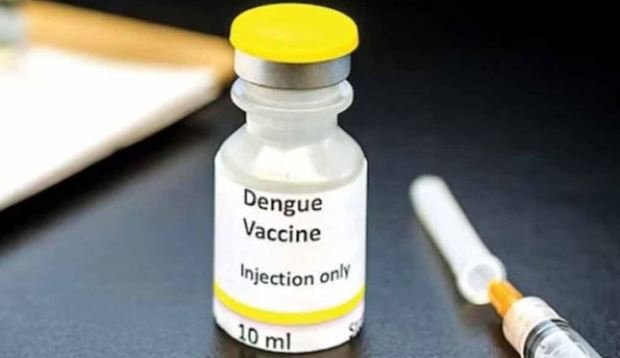The TV005 single-dose tetravalent dengue vaccine candidate demonstrated favorable outcomes concerning safety and immune response in individuals of all age groups, including children and adults
Bangladesh has successfully conducted its first-ever trial for a dengue vaccine. The dedicated team of researchers from the International Centre for Diarrhoeal Disease Research (icddr,b) and the Larner College of Medicine at the University of Vermont in the US achieved this significant milestone, as announced by icddr,b on Thursday.
The results of this pioneering clinical trial, published in the prestigious international journal Lancet, have introduced the world to the TV-005 vaccine, also known as Tetravalent. This vaccine has exhibited remarkable efficacy against all four existing types of the dengue virus, namely Den-1, Den-2, Den-3, and Den-4.
You Can Also Read: COULD A NEW DIABETES DRUG BE THE ANSWER TO OUTPERFORMING OZEMPIC IN WEIGHT LOSS?
Notably, the vaccine’s experimental application has shown that a single dose can provide protection against dengue, offering hope for simplified prevention strategies. However, as the researchers wisely caution, further research is imperative to comprehensively assess the vaccine’s safety and effectiveness. This momentous achievement marks a significant step forward in the global fight against dengue, and ongoing research endeavors will continue to illuminate the path towards a dengue-free future.
Dengue
Dengue is a mosquito-borne virus. Mild manifestations of dengue typically encompass symptoms such as fever and bone pain, while severe cases can lead to shock, bleeding, and, tragically, even death. The dengue virus comprises four distinct serotypes, denoted as DEN-1, DEN-2, DEN-3, and DEN-4, any of which can cause illness in an affected individual.
Dengue, a virus transmitted by mosquitoes, represents an escalating global threat, particularly in tropical areas. Its milder cases manifest as fever and bone pain, while more severe instances are associated with shock, bleeding, and sometimes even fatalities.
Battling Dengue Outbreaks
Bangladesh, a densely populated country with approximately 170 million people, has grappled with dengue outbreaks for over two decades. The year 2023 has witnessed the most severe outbreak on record, leading to an overwhelming number of hospitalizations and tragic deaths. In the face of this ongoing crisis, a beacon of hope has emerged through the “Dengue in Dhaka Initiative (DIDI)” launched in 2015. Researchers from icddr,b and the University of Vermont (UVM) embarked on groundbreaking research, conducting the first-ever clinical trial for dengue vaccines in Bangladesh.

TV005 Dengue Vaccine
The pivotal study, published in The Lancet Infectious Diseases, focused on assessing the safety, immunogenicity, and 3-year durability of the TV005 tetravalent live-attenuated dengue vaccine. This innovative vaccine, unlike its counterparts, holds a unique distinction as a single-dose tetravalent dengue vaccine. This feature sets it apart in the realm of dengue vaccines and promises great potential for widespread use in endemic populations.
The study enrolled nearly 200 volunteers spanning four different age cohorts (ages 1-49 years) who received either the TV005 vaccine or a placebo between 2016 and 2019. The results were nothing short of promising. TV005 demonstrated excellent tolerance, eliciting antibodies against all four dengue serotypes. More remarkably, there were no reported cases of dengue among the vaccinated volunteers.
Dengue Prevention
Dr. Rashidul Haque, senior scientist and lead investigator at icddr,b, highlighted the urgency of an effective tetravalent dengue vaccine for Bangladesh. As the country continues to grapple with increasingly severe dengue outbreaks, the TV005 vaccine offers a glimmer of hope. “We are proud to participate in the evaluation of the TV005 vaccine in the Bangladeshi population and hope that our work will accelerate the development of dengue vaccines for our country,” Dr. Haque asserted.
Dr. Beth Kirkpatrick, leading the UVM research team, underscored the significance of TV005’s unique single-dose feature. “The TV005 vaccine is the only single-dose tetravalent dengue vaccine, which is an important feature of this vaccine. It also appears to prompt immune responses to all four of the dengue serotypes, which is important for any tetravalent dengue vaccine,” Dr. Kirkpatrick noted.
Looking Beyond Bangladesh
The implications of this groundbreaking research extend beyond the borders of Bangladesh. Dengue is a global health concern, and effective vaccines are crucial for controlling its spread. While pharmaceutical giants Sanofi and Takeda have made progress with their own tetravalent dengue vaccines, the TV005 vaccine’s single-dose capability and promising immune response make it a strong contender.
Sanofi’s three-dose vaccine is limited to children under nine years of age with known past exposure to dengue, whereas Takeda’s two-dose vaccine has shown the best response to dengue serotype 2. The TV005 vaccine, by contrast, presents a simpler and potentially more accessible option for dengue prevention.
Research and Hope
The work of the DIDI team and other ongoing studies hold the promise of further advancing our understanding of the TV005 vaccine. Efficacy, durability, and immune responses will be closely monitored to ensure the vaccine’s effectiveness in the real-world scenarios of Bangladesh and beyond.
As Bangladesh and the broader South Asian population continue to grapple with the burden of dengue, the strides made in vaccine research bring hope for a future where dengue outbreaks no longer result in suffering and loss of life. The TV005 vaccine’s potential to provide a safe and effective defense against this mosquito-borne disease is a testament to the dedication and collaboration of researchers working tirelessly to make this vision a reality.
Importantly, this vaccine has undergone a comprehensive series of 42 trials conducted in diverse countries worldwide. Notably, the third phase of these trials was conducted in India.


